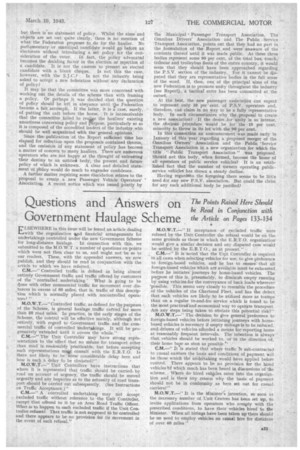Questions and'Answers on The Points Raised Here Should Government Haulage Scheme the Article on Pages 133-134
Page 23

If you've noticed an error in this article please click here to report it so we can fix it.
• .
ELSEWIIERE in this issue will be found, an article dealing 1.--swith the organization %id financial arrangements for undertakings controlled under the new Government Scheme for long-distance haulage. In Connection with this, we submitted to the M.O.W.T. a number of questions on points which were not then clear to us, and might not be so to our readers. These, with the appended answers, we now publish, and they should be read in conjunction with the article to which we have referred.
CM.—" Controlled traffic is defined as being almost entirely Government traffic and traffic offered by customers of the controlled ..undertaking.' What is going to be done with other commercial traffic for movement over distances in excess of 60 miles, that is, traffic of this description which is normally placed with uncontrolled operators? "
M.O.W.T.—" Controlled traffic, as defined for the purposes of the Scheme, is general haulage traffic carried for more than 60 road milea. In practice, in the early stages of the Scheme, the control will be effective 'mainly, although not entirely, With regard to Government traffic and the commercial traffic of controlled 'Undertakings. It will be proeressiVely extended until it covers the whole."
C.M.—"The Unit Controller may have strong -representations to the effect that no means for transport other . than road is reasbnably 'practicable, but before accepting such rePresentations =mit consult with the E.R.T.O. Is there not likely to be some considerable delay here and how is such a delay 'Co be obviated?"
M.O.W.T.—" Unit Controllers have instructions that where it is represented that traffic should be carried, by road on account of urgency; the traffic should be moved urgently and any inquiries as to the necessity of road transport,should be carried out subsequently. (See-Instructions on Traffic Acceptance.)"
C.M.—" A controlled undertaking may not accept excluded traffic without reference to the Unit Controller, except. that offered to it by an Area Road Traffic Officer. What is to happen to such excluded traffic if the Unit Controller' refuses? That traffic is not supposed to be controlled and there appears to be no provision for its movement in the event of such refusal." If acceptance of excluded traffic were refused by the Unit Controller the refusal would be on the same grolinds as those in which the E.R.T.O. organization would give a similar decision and any disputed case would be settled •by the E.R.T.O., as at present." •
C.IY1.—'7 It is noted that the Unit Controller is required in all cases when selecting vehicles for use, to give preference to foreign-based vehicles, and he has to ensure' that all foreign-based vehicles which are available must be exhausted before he initiates journeys by home-based vehicles. The pugpose of this is, presumably, to diminish empty running by using vehicles for the conveyance of back loads wherever "possible. This seems very closely to resemble the procedure of the vehicles of the Chartered Fleet, and. has the defect that such vehicles are likely to be utilized more as tramps than on a regular to-and-fro service which is found to be the most practicaand economical way to operate transport. Are any steps being taken to obviate this potential risk?"
M.O.W.T.—" The decision to give general preference to foreign-based vehicles before initiating journeys with homebased vehicles is necessary if empty mileage-is to be reduced, And drivers of vehicles afforded a means for reporting home at reasonably frequent intervals. The intention is always that. vehicles should be worked to, or in the direction of, their home bar as stoon aipossible.4' •
C.M.—" It is stated that where traffic sub-contracted to casual carriers the basis and conditions of payment will be those which the Undertaking would have applied before control. There appears to be no provision for the hired vehicles bf which much-has been heard in discussions of the scheme. Where dohired vehicles enter into the organization and is there any reason why the basis of payment should not be in conformity as here set out for casual carriers?"
M.O.W.T.—" It is the Minister's intention, so soon as the necessary number of Unit Centres has been set up, to invite applications from operators who comply with the prescribed conditions, to have their vehicles hired to the Minister. When all hirings have been taken up there should be no need to employ vehicles on casual hire for distances of over 60 miles.–




















































